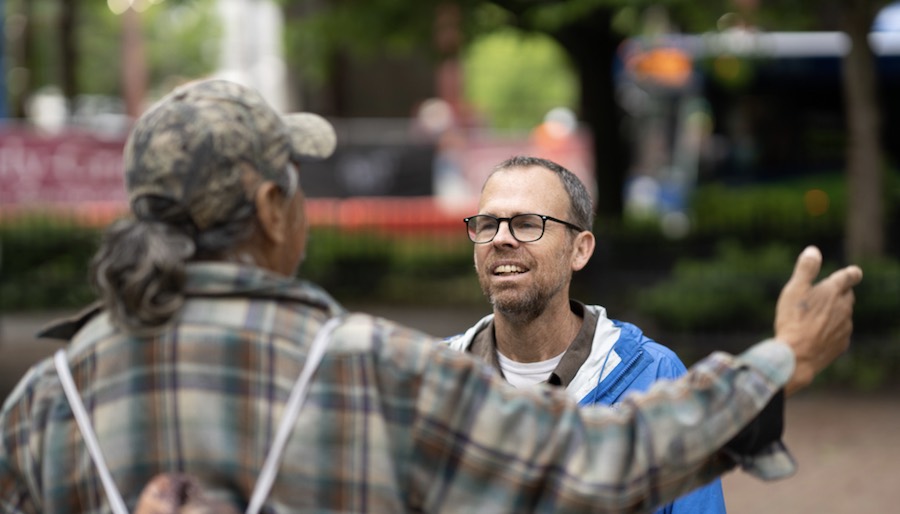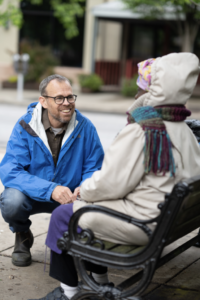
Mark Siler is Following a Passion to Help Those Less Fortunate
By Les Gura
Mark Siler had spent his adult life working first as a social worker and then as a chaplain and pastor to reach out and help the forgotten – homeless people, the imprisoned, the destitute. He came to realize, he says, there is typically a common thread in people who society most often forgets or ignores, and that is access to bio-psycho-social-spiritual wellness.
Six months before the COVID-19 pandemic began, Siler made the life-altering decision to give up his associate pastor role at a church serving the homeless in Asheville to instead become clinically licensed in social work, the field in which he received his degree 30 years ago. He joined CareNet Counseling, opening a unique new practice in the city he has called home for 20 years.
Offering a way to connect
Since September 2020, Siler has worked with the homeless and the recently housed, offering people a way to connect, via both the traditional role of a therapist and the practical perspective of sharing or linking them to resources born of his years of networking with government agencies, social service organizations, and churches and nonprofit entities. Central United Methodist Church in Asheville donated space for Siler to meet with his clients.
“What I’m doing is just a niche that nobody was doing, in a sense,” Siler says. “I find it deeply satisfying to be able to meet folks where they are and develop relationships that then will allow many who are interested and ready to have a space to do some of the deeper healing work that they never had a chance to do or try.”
Kevin Parker, director of CareNet’s Western region, says Siler’s work is crucial.
“Meeting folks ‘where they are’ is a common statement from therapists and a hallmark in our work,” Parker says. “Mark’s work removes all the barriers associated with someone having to go somewhere like the therapist’s office to receive treatment. He takes treatment directly to the people.”
Seeing from a different perspective
Siler recognizes, especially having worked with the homeless as an associate pastor, that there are challenges involved. In his four years of crisis ministry at Haywood Street Congregation, which served 400 to 500 people who were down on their luck, he was fortunate to be able to give individuals five minutes of attention at a time. He says he often felt helpless as he watched peoples’ conditions deteriorate.
Now that he is able to spend more time with individuals in his role as a therapist, he is slowly seeing things from a different perspective.
“Often, the folks I am working with are described as people who suffer from severe and persistent mental illness. And I realize that rubs me the wrong way,” he says. “What feels more accurate is that they have severe and persistent instability. People who experience homelessness, many through their entire life, deal with incredible instability, trauma and unpredictability.”
In a therapeutic role, he says, they finally have a chance to address some deep-seated issues. But there are unique challenges in serving as a therapist to the homeless. That’s where his ability to connect clients with resources can provide some measure of stability, though it is a work in progress, for sure, Siler says.
“Counseling relationships depend on people being able to make appointments,” he says. “People on the street or even those recently housed have to rely on unreliable public transportation. And there are a lot of health issues. People get sick, and there is a high no-show rate.”
Though some may believe working with the homeless might be scary, Siler says his background of working in prisons and also with people re-entering society after prison has prepared him for the instability he often sees with his clients.
“What’s so unbelievably different is that now, after years of working in this community, I am known. And when I come up on hard situations, 95% of the time I know the people involved. I know their names,” he says. “And most of the time they’ve had some kind of positive experience with me, and that makes all the difference in the world.”
Serving on boards in the community and being involved with community organizing efforts also allows Siler to gain influence.
Build trust, remove barriers
“What I’ve figured out is that I love both the one-on-one, deeply personal work, but I also have to be connected to the kind of social change work that I know plays a huge role in suffering,” he says. “I need to be able to put my energy in both to sort of feel complete.”
Parker says eight months into his new role, Siler’s work “has exploded.” “He’s serving many people every day daily, and many more indirectly during the week,” Parker says. “His advocacy work with multiple human service agencies has improved patient connection to resources and service providers that are literally joining Mark in the streets to serve patients.”
In fact, working with the homeless is a privilege that well suits the mission of Wake Forest Baptist’s Division of FaithHealth, which includes CareNet.
“The way the medical model works,” Siler says, “people have to be well enough to get to offices and have enough trust and faith in the people who serve in care roles to even want to go. FaithHealth realizes that’s too much of a gap for a lot of people, so we have to go and build trust and remove barriers and make wellness very accessible to all people. And that’s exactly what’s motivating me.”
Photos: Lynne Harty
